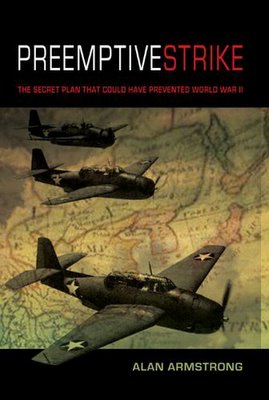
Check it out, y'all!!! My boss wrote a book! And, over the past 2 1/2 years I've worked there, I can tell you... a LOT of research went into this...I think over four years altogether?! And it took 2 1/2 years to get this critter written, etc..... I can tell you - I personally (along with another lady) typed vast quantities of this manuscript (note: I said, TYPED, not "wrote" - note the difference!) and subsequent revisions...and re-revisions...and re-re-revisions.....and re-re-re-revisions....
So, WW2 history buffs, CHECK IT OUT! "Preemptive Strike: The Plan that Would Have Prevented the Attack on Pearl Harbor" CLICK HERE
Book Description
Could a plan to destroy Japanese supply lines, communications, and staging areas in China have averted the horrendous and devastating attack on Pearl Harbor? On July 23, 1941--some five months before Pearl Harbor--President Franklin Delano Roosevelt endorsed a plan calling for the United States to provide China with 150 manned bombers and 350 fighter planes to wreak havoc on Japan's growing presence in China. "Joint Board Plan 335" had been proposed to Roosevelt and his cabinet by Generalissimo Chiang Kai-Shek; Dr. T. V. Soong, China's foreign minister to the United States; and Captain Claire Lee Chennault, a retired Air Corps pilot now in the employ of Kai-Shek. Such a preemptive strike on Japanese interests had been under discussion for several months. Although initially blocked by General George C. Marshall, the plan was resurrected in the spring of 1941. So why then was it never employed?
First, there were the practical reasons: Not yet fully recovered from the Great Depression, millions of Americans were more focused on domestic issues than foreign policy. Roosevelt and his cabinet feared political fallout from Kai-Shek's proposed international intrigue, to say nothing of facing Winston Churchill's wrath by diverting airplanes from Britain. Then there were also ethical concerns over the certain civilian casualties the air strike would inflict. Could Roosevelt justify bombing raids when the U.S. and Japan were officially at peace? Kai-Shek and Chennault argued that their plan would serve as a moral quid pro quo to an adversary that had been bombing and slaughtering millions of Chinese civilians for three years. The raids, Chennault argued, would forestall Japanese expansion into Malaya, Singapore, the Dutch East Indies, and the Philippines.
Painstakingly researched and colorfully written, PREEMPTIVE STRIKE offers a seldom-seen glimpse of the political and moral pressures brought to bear on Roosevelt's prewar cabinet. It is sure to prompt debate, as much as the decision to use this wartime strategy does today.
About the Author
ALAN ARMSTRONG is an aviation attorney, an active pilot, and a contributing editor to the Lawyer Pilots Bar Association Journal. He has written articles on aviation law for various journals. Armstrong has testified before the House Aviation Subcommittee of the House of Representatives, is chairman of the Aviation Section for the State Bar of Georgia, and is a founding member of the National Transportation Safety Board Bar Association.
Product Details
* Hardcover: 240 pages
* Publisher: The Lyons Press (June 1, 2006)
* Language: English
* ISBN: 1592289134
* Shipping Information: View shipping rates and policies





0 comments:
Post a Comment